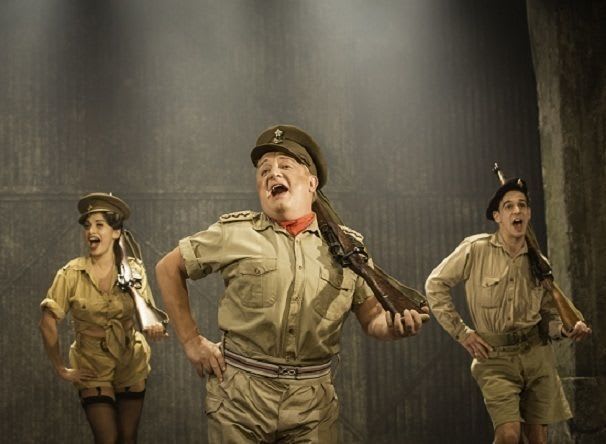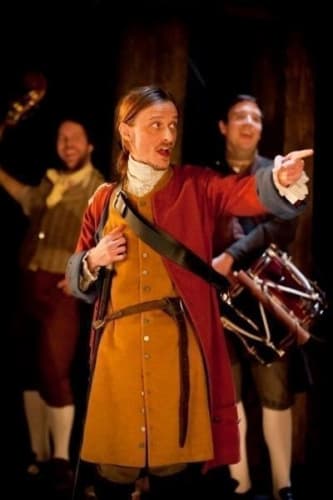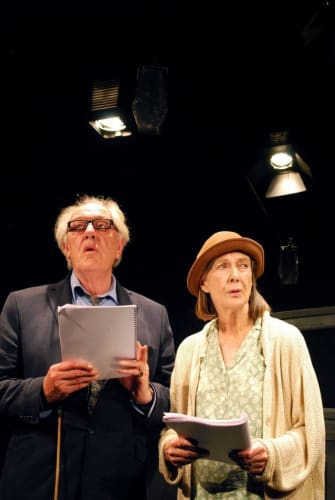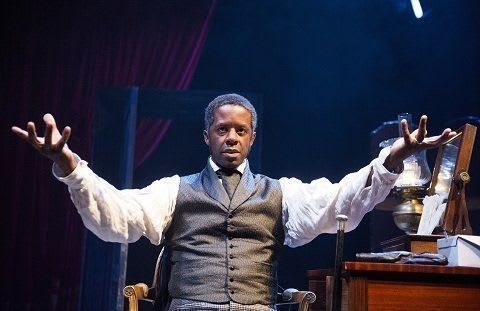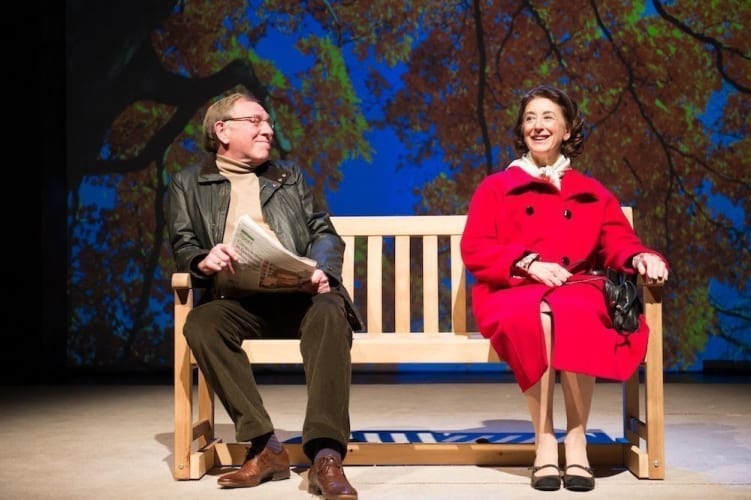Smaller Theatres
It feels as if every year there is a significant change in personnel running many of the theatres in this category.
In some cases, this can bring a breath of fresh air but in others it creates a feeling of uncertainty for regular habitués and nowhere is this more likely than at the Tricycle.
After 28 years of Nicolas Kent's sure leadership, Indhu Rubasingham has made a very promising start but it will still take the locals time to become familiar with a new Artistic Director.
Under the old regime, perhaps the best work in 2012 was yet another of Kent's accumulations of short works working around a single political subject. The Bomb - A Partial History featured 10 short plays in two parts spread across five hours.
As always, Kent had the ability to draw on the services of top quality playwrights such as Ron Hutchinson, Zinnie Harris and David Greig, the last perhaps inevitably producing the best of the lot. Indeed, so popular was The Letter of Last Resort that it went on to make up part of a double bill at the Traverse during the Edinburgh Festival Fringe.
In the interregnum between directors, the latest play by Sir Alan Ayckbourn, the very characteristic Neighbourhood Watch, made its London debut following runs in Scarborough and New York.
Miss Rubasingham started on a high with Red Velvet, a fascinating work about black actor Ira Aldridge played by Adrian Lester, who just coincidentally happened to be the husband of the playwright, Lolita Chakrabarti.
This is extremely well written and combined an enjoyable jaunt back to the theatre of 150 years ago with some serious statements about race relations then and now.
Just up the road at Hampstead, Ed Hall presided over some real high points as well as the odd low.
Once again, it was the all-day events that really shone. Any visit by Hall's own company Propeller with their all-male Shakespeare presentations is likely to be a pleasure and this year's double bill of The Winter's Tale and Henry V proved no exception.
For those who like their work a little more modern, Hampstead also hosted a trilogy of plays by Irish playwright Tom Murphy originally produced by Druid in Galway. Each of these was intriguing and insightful. It has to be said that while A Whistle in the Dark and Conversations on a Homecoming also provided much amusement, Famine which rounded off the day was inevitably pretty grim but nonetheless made for absolutely compelling viewing.
More dashing, in every sense of the word, was Mike Bartlett's theatrical version of Chariots of Fire, which compounded all of the excitement of the Olympic Games into a couple of breathless hours.
The combination of Hall's direction and a set designed by Miriam Buether, featuring a running track in its midst, guaranteed that a good time was had by all.
Farewell to the Theatre by Richard Nelson was a quiet, biographical work about Harley Granville Barker that will have appealed to the theatrical cognoscenti.
Hampstead has also created a new studio theatre downstairs, and while the press were rarely invited in, Tu I Teraz (Here and Now) by Nicola Werenowska was a worthy piece about Polish immigrants that might at some point manage a deserved move upstairs.
The Menier Chocolate Factory peaked with its production of Merrily We Roll along, reviewed under musicals.
It also provided a welcome opportunity to have another look at Abigail's Party by Mike Leigh, which was as funny as ever under Lindsay Posner's direction with Jill Halfpenny in the lead.
Another much older comedy, Brandon Thomas's Charley's Aunt never really took off, despite the attractions of Gavin and Stacey's Matthew Horne playing the ubiquitous cross-dresser.
Two other theatres were also bedding in new Artistic Directors.
Following Josie Rourke's move across London to the Donmar, Madani Younis took over the reins at the Bush. His varied opening season probably peaked with Chalet Lines, a rich comedy set in a northern holiday camp.
At the Gate, Christopher Haydon is also beginning to make his mark with assorted programming that included the intriguing Sunset Baby by American playwright Dominique Morisseau in a world première directed by Charlotte Westenra. This looked at a radical hippy lifestyle from two time perspectives.
Amongst smaller theatres, Southwark Playhouse has become one of the most reliable, alongside the Finborough and the Orange Tree.
This owes a considerable amount to Red Handed Theatre and its Artistic Director, Jessica Swale. This company has found itself a wonderful niche with novel readings of Restoration comedies, this year reviving The Busy Body by Susanna Centilivre and providing raucous fun in doing so.
There can also be more versatile, creating a highly sensitive and watchable new production of Frank McGuinness's Someone Who'll Watch Over Me, the play about three hostages imprisoned in Iraq and uncertain about their life prospects.
Another impressive young director is Blanche McIntyre who provided another reminder of her talents with an unforgettably moving production of The Only True History of Lizzie Finn by Irish playwright, Sebastian Barry.
In a big year for Eugene O'Neill, The Hairy Ape demonstrated his strength in depth in the capable hands of yet another up-and-coming female director, Kate Budgen who created a well-acted visual delight underneath the arches of London Bridge station.
Less successful but still worthy of note was Anya Reiss's updated take on The Seagull. It is always going to be difficult to blend contemporary Britain with pre-revolutionary Russia and despite the efforts of all concerned, the twain ne’er quite met on this occasion.
It is possible that the Finborough's greatest success in 2012 was in seeing its talented discovery James Graham hitting the big time with This House at the National and knowing that Anders Lustgarten is not far behind.
On home soil, there was still much to enjoy with a stream of revivals of largely forgotten plays, usually by well-known writers.
Cornelius may not be the best play that J B Priestley ever wrote but it was still well worth seeing and Sam Yates created a typically busy Finborough revival that acted as a strong reminder of how much worse the Depression was than our current recession.
Arthur Miller's The American Clock comes from exactly the same era but the other side of the Atlantic. Phil Willmott lovingly recreated the experiences of American Jews observing the inception of Nazism from a distance, with their very mixed reactions and feelings.
Sutton Vane is a far less well-known playwright but his Outward Bound was another good addition to the list. This became a truly magical play in the capable hands of Louise Hill and proved to be a mysterious delight with a lovely coup de théàtre in the tail.
Don Juan Comes Back From the War by Ödön von Horváth was something of a louche homage to all of the Don Juans and Don Giovannis that have been written through history.
Sam Walters continues to unearth wonders at the Orange Tree in Richmond, which celebrated its 40th birthday this year.
Starting at the end of the year, his production of Feydeau's farce, Sauce for the Goose, currently has its audience in stitches, despite the lack of doors and bells to adorn the stage.
Play House and Definitely the Bahamas by Martin Crimp proved to be a typically elusive double bill, featuring one new play and one old, both of which proved to be well worth a viewing.
Allan Monkhouse's The Conquering Hero looked at war through highly critical eyes, advocating pacifism ahead of gung ho national pride.
Love's Comedy is of all things a frothily light comedy written by a young Henrik Ibsen and very amusing it was too. If only he hadn't got so serious, who knows where this promising and highly optimistic playwright might have ended up? More of that later.
Yours for the Asking by Ana Diosdado, is an allegorical thriller set in a rather sinister Spain in the years when that country was far from the (admittedly impecunious) tourist destination that it subsequently became. Strangely, it probably gets closer to J B Priestley than any Iberian writers of the past.
Finally, Jules Feiffer's The White House Murder Case pretty much lived up to its name, taking a satirical look at American politics and throwing in some amusing detective work to add to the fun.
Jermyn Street Theatre arguably pulled off the biggest coup of the year when it managed to attract Sir Trevor Nunn's production of Samuel Beckett's All That Fall.
As if that wasn't enough, they then cast Dame Eileen Atkins and Sir Michael Gambon in leading roles in a superb evening that later transferred into a larger West End house.
The same theatre also saw a revival of Charles Dyer's claustrophobic drama Mother Adam well-acted by Jasper Britton and Linda Marlowe playing a couple who could as easily have been married as son and mother, such is their bickering.
St John's Night was another light, amusing early play by Ibsen that thoroughly entertained under the assured directorship of Anthony Biggs.
One of the most original takes on a Greek tragedy seen in some time was Mike Bartlett's Medea for Headlong at the Watford Palace Theatre. With Rachael Stirling giving her all in the leading role, this moved the action to contemporary suburbia with absolutely chilling resonance for audiences watching it in contemporary suburbia, since it felt and was so close to home.
The National Theatre of Scotland paid a visit to London with a site-specific performance entitled Enquirer. This took a wry and frankly cynical look at the world of journalism, demonstrating all too clearly that newspapers and honour parted company long ago.
Before the two West End Uncle Vanyas hit town on the same weekend, a thoughtful much smaller-scale production proved popular at the Print Room in Notting Hill Gate. Lucy Bailey directed a strong cast led by Iain Glen, David Yelland and Charlotte Emmerson.
For some reason, possibly because it required intimacy, Jack Thorne's latest two-hander Mydidae played in the upstairs studio at Soho Theatre rather than a larger, higher profile venue. Vicky Jones and her cast of Phoebe Waller-Bridge and Keir Charles ensured that viewers enjoyed a really intense experience observing the ups and downs of marital life today.
Sex with a Stranger by Stefan Golaszewski, at Trafalgar Studios 2 was another drama of modern relationships, though viewed from something of a different perspective, with a superb cast of Russell Tovey, Jaime Winston and Naomi Sheldon.
At the Riverside Studios, Salad Days prove to be a fun filled frolic. This is a musical from the 1950s that while completely of its time still has the ability to entrance modern audiences of all ages and duly did so.
It was also the kind of show that might just manage a limited West End transfer some time and, if it does so, would be at least as good as much of the competition.
The Arcola has now settled into its new premises and amongst other offerings in 2012 revived Philip Ridley's The Pitchfork Disney, a strange and unsettling in-yer-face play that is perhaps now more of historical interest than the shocker that it once was.
It seems fitting, since he seemed to have more plays performed in London than anyone else this year, to finish with yet another Eugene O'Neill. One thing we have learned is that this writer of legendary plays including Long Day's Journey Into Night and The Iceman Cometh also penned so much more of high-quality.
The Sea Plays, atmospherically produced by Laurie Sansom in the Old Vic Tunnels, were thought-provoking and impressive. They comprise a triptych of nautical works allowing viewers to understand how tough life was on the high seas in the years around the Great War.
